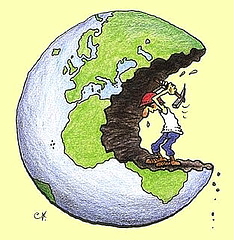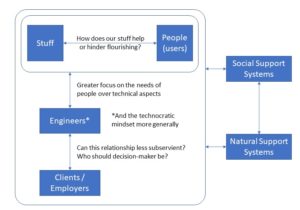Technology and the Engineer in a Post Growth World: A Guide for Inquiry
– By Tonatiuh Rodriguez-Nikl
Through this blog post I’d like to introduce my interests as a Maintainers Fellow by laying out my driving question and an approach for arriving at an answer. The main question that has been with me for some time now is:
What do we need to preserve as we transition to a post-growth world?
This question is motivated by two intuitions: first, that a post-growth economy is coming, and second, that a post-growth economy, far from being disastrous, is something to look forward to. The first intuition reflects a sense of inevitability. Indefinite growth is not sustainable.Thinking otherwise is physically impossible and feels like wishful thinking fed by human hubris. The climate crisis, and the slow pace of action to address it, only adds urgency to this conclusion.

The second intuition reflects a discomfort with the multitudes of products, services, and content that we’re encouraged to consume daily. (“Consume” is such a telling word, as it is associated with using up completely without replenishment.) I am not against using stuff, but I do see an important difference between advancements such as antibiotics and sanitation on the one hand, and on the other, binge-watching cat videos and getting the latest popular cell phone every two years. The former arguably improves the human condition, allowing us to flourish in important ways. The latter may well inhibit human flourishing by keeping us running ever faster like pet hamsters on the hedonic treadmill, momentarily satisfied but distracted from meaningful activities and projects. If this is true, it follows that removing these distractions will improve our lives.
I am well aware that many people disagree with my two intuitions, especially the latter. I am also aware that these topics are far more complicated and nuanced than I have portrayed. Nonetheless, they seem to me obvious enough that, at least for now, I prefer to move on to envisioning the positive potential of a post-growth reality rather than getting bogged down in proving these intuitions.
Let’s return, then, to the main question:
What do we need to preserve as we transition to a post-growth world?
This is a rather unwieldy question that raises several other large questions such as:
- What do people and societies need for flourishing?
- In what ways do we need to change our attitude towards our stuff? I ask this question both in personal terms (what is each person’s relationship to their belongings?) as well as societally (what is our relationship to our technology?).
- In what ways do we need to re-envision our attitude towards our natural and social support systems?
These difficult questions are already being addressed by a variety of individual disciplines. I don’t see my role as generating knowledge on any of these fronts, but as putting existing knowledge together, synthesizing the information coming from these diverse fields in a way that helps us understand our future. To limit the scope of these questions and make them more manageable, I’ll constrain my task at hand, aiming to build a conversation among people closer to my role as a professor of engineering: students and like-minded colleagues, both academics and practitioners (an interesting new group of academics with whom I have connected recently is the Planetary Limits Academic Network). This new focus limits the main question to the following somewhat more manageable question:
What is the engineer’s role in a post-growth economy?
This question is still quite relevant to non-engineers given the extent to which technology pervades and mediates our lives and the immediate role that engineers have in the development of technology. Incidentally, when I say “technology” I mean more than just computer-related “tech”. Following the approach in my engineering ethics textbook, I use an inclusive definition of “technology” that includes engineered products, the processes leading up to their fabrication, and the creative use of nature for human purposes. By this definition, chairs and forks are also technological objects.
To investigate the engineer’s role in a post-growth world, I propose the following approach :
- First, explore the relationship between people (users of technology) and their stuff, which includes both personal belongings and infrastructure such as the Internet. It is most important to clarify the ways in which stuff hinders or helps flourishing (and in what ways flourishing may be independent of stuff).
- Second, explore the relationship between engineers, the stuff they create, and the users of that stuff.
- Third, explore the relationship between engineers and their clients or employers.
- Lastly, provide sufficient context about the broader natural and social support systems to render the previous questions intelligible.

This approach is aspirational, focusing on what we might observe in a post-growth setting. I’ll conclude with my hunches about where some of the answers are headed. Much of present-day growth depends on novelty and disposability; in contrast, our post-growth stuff will be more durable, both materially and functionally, and maintenance will become a primary consideration. Without continual trivial consumption to distract us, better opportunities may arise for people to flourish. In response to a need for designs that last longer, post-growth engineers will ideally improve their understanding of the longer-term needs of people, basing their work more on notions of care for people than on utilitarian tradeoffs and short-term marketing fads. Currently, in their relationships with clients or employers, engineers tend to be subservient and are seldom able to exert a significant influence in the overall direction of the technologies in which they are implicated. However, engineers are by no means the only ones that are excluded from important decisions about the direction of technology; we all are. Thus, we need to revisit existing power structures, which can’t be understood without exploring the role of capitalism in the overall dynamic of technological production and the pro-growth imperative.
Well, it appears that my attempt to limit the scope of inquiry was not so successful after all; these are still rather unwieldy issues. But I do enjoy a challenge and I’m inspired to work on these questions together with my fellow Fellows and our Maintainers mentors, so onward we charge. It would also be valuable to engage with readers’ suggestions; if you have any suggestions for developing these ideas, please feel free to reach out to me by email at trodrig7@calstatela.edu .
“ NOTE: All images that are not explicitly cited from an external source were created by the author.”